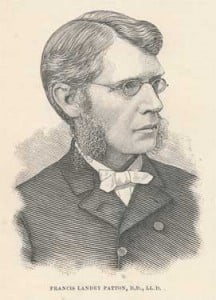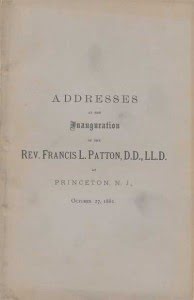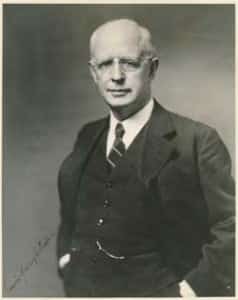For our Sunday sermon, we present the following transcript of a tract authored by the Rev. Thomas Verner Moore, subject of our blog on Saturday. This tract was number 62 in a series issued by the publications arm of the old Southern Presbyterian denomination. What can we learn from this evangelistic presentation, when compared with modern day efforts?
WHAT CAN I DO?
This is a question that is often asked by those on whom the matter of personal religion is pressed, and although sometimes asked in a spirit of evasion, is frequently asked in sincerity. We propose to answer this question, and to show some things at least that may be done to secure eternal life.
Before specifying these things, it may be proper to say, that none of them are necessary prerequisites to a believing reception of Christ. It is the duty of every one who hears the gospel to receive it at once, and without delay, or qualification, to accept the Saviour just as He is offered, without waiting for any more feeling, any more conviction of sin, any more preparation of heart, or any better state of soul than when there is an honest desire to be saved from sin in its guilt and pollution. To suppose that it is needful to wait for any protracted preparation, any washing of the outer scales of the leprosy before coming to the great Physician, is to contradict the whole tenor of the gospel, which calls on the sinner to come to repentance, on the sick to come to the Physician, on the heavy-laden to come to the relieving hand that can give them rest. But as there are some who say, “We know not how to come to Christ, we find no real or active interest in our hearts on this subject, our judgments are convinced but our hearts are utterly unmoved, and yet we are willing to do whatever may be done to awake a deeper interest in our bosoms, and bring us to the point of a sincere and hearty surrender to Christ, if we only knew what we could do.”
We will try to meet this desire, and to specify to such persons some things that they can do, and if they are not mistaken in this view of their feelings, they will be willing to do these things, and the doing of them will either impel them farther forward towards the cross, or show them that there is some wedge of gold or Babylonish garment that is hidden beneath the tent.
1. You can begin to consider the question of personal religion. It is the want of consideration that causes much of the indifference you feel on the subject. Have you ever given it one hour of serious reflection? Have you ever retired to your room and there carefully thought on this matter, in the presence of God, and with a sense of His omniscient scrutiny? Have you not rather banished it from your thoughts and tried to avoid what would produce serious reflection? Have you not been afraid to go alone, and face to face, with an unseen but all-seeing God, gaze on this high and awful question? This then you can do. You can retire to-day, or to-night, to some private place, and there think of the fact that you are a sinner, that you are making God your enemy every day, that you are standing in a path that for six thousand years has been swept by the whirlwind of His wrath, that this awful tempest may be unloosed at any moment, that there is nothing between you and the bottomless abyss but a thin partition that may give way in an instant by disease or accident, that you are hanging all the concerns of eternity on a mere perhaps, and that thousands have perished by doing just what you are doing now. You can think of Calvary—why Jesus suffered, why you can treat those sufferings so lightly, why you think so little of a Saviour’s blood, and how fearful a thing it must be to have that blood lying neglected at your feet. Will you consider this matter not once, but again, and again, until you feel that you are in danger and must have a deliverer?
2. You can pray. You say that you cannot regenerate yourself, or change by any direct act your affections; that God alone can do these things. Has not God said that He is willing to do them for all who desire it? If you really desire these things, you can pray for them, for prayer is only the offering up of our desires to God for things agreeable to His will, in the name of Christ Jesus. Then as you ponder, you may pray, and at least say, “God be merciful to me a sinner,” and if this prayer is sincerely offered, you have the assurance of actual fact in regard to the certainty with which it will be answered.
3. You can read. You have the Bible. Read the 51st Psalm; the 53rd and the 55th of Isaiah; the 12th to 16th chapters of Luke; the 3d chapter of John; the 4th and 5th of 2d Corinthians, or similar portions of Scripture, which may readily be found. You can get religious books, such as James’s or Henry’s Anxious Inquirer, the Great Question, the Way of Life, Baxter’s Call, the Memoirs of McCheyne, Henry Martyn, or some of the many excellent works so easily accessible by the distributing agencies of our religious literature. Read them daily, and keep your soul thus in contact with the great facts of religion. Do this every day.
4. You can avoid what will dissipate serious reflection. You know what this is by experience, for you have sought it in various forms. The persons, the things, the reading, and talking, and acting, that are unfriendly to religious thought, you know better than any one can tell you, and these things you can avoid, and thus fence in the soil to some extent from the fowls that pick up the seed.
5. You can seek the means of instruction. You can go to your pastor, or some Christian friend and ask him to explain the way of salvation to you. You would do so with your physician if your body was disordered, why not with your spiritual physician when your soul is disordered? You can not only attend church on the Sabbath, but you can attend the weekly lecture and prayer-meeting. The very reason that makes you shrink from attending these meetings is the reason that should take you there, if you are in earnest in what you say. “Then shall ye seek Me and find Me when ye shall search for Me with all your heart.”
6. You can resolve to abandon all that is sinful. You will find your real difficulty here. You love sin, in some form, this is the real reason of your difficulty in coming to Christ. Now you must choose between sin and salvation. If you are unwilling to give up your hold of the one, you must give up your hope of the other. If you would know your sins, take up the Decalogue, or Galatians 5:19-23, or Colossians 3:5-15, or similar portions of God’s Word, and you will readily discover them. But you do not need even these special inquiries. You know them already. Are you willing to endeavor, from this time, to abandon them, as far as in you lies?
7. You can resolve to begin the discharge of every known duty. You know what God requires of man. This He requires of every one, and hence of you, and he requires it of you now. Your secret feeling is that these duties are obligatory only on a Christian. But this is a mistake. They rest on all, and a Christian is only trying to do, what is binding on every one, and you among the rest. You ought to do these duties whether you are a Christian or not. The proof that you are willing to be a Christian will be found in the fact that you are willing to begin the discharge of these duties. If unwilling, you do not desire really to be a child of God; if willing, begin them now, for they are binding on you now; you are a rebellious child, but still a child, and bound to do all the duties of a child, and if you wish to return to your Father, that wish will be manifested by beginning to obey him as a child. Here again is the second great test of your sincerity.
8. You can then try to look to Jesus for pardon, for strength, for holiness, for happiness, and for eternal life. You can try to believe that Jesus will do as he has promised to do, save those who strive honestly to trust and obey Him. Is it not strange that this should require any effort? Then try these things, and as you take one step, you will see more readily how and when to take another.
Tract no. 62.
Richmond, VA: Presbyterian Committee of Publication.




